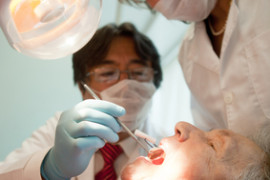In the latest in a surge of research exploring the relationship between poor oral health and dementia, researchers in Spain have recently completed a case-control study examining cognitive impairment in 400 individuals over 50. Study participants were assessed for both cognitive impairment as well as traditional clinical signs of periodontal disease—tooth loss, clinical attachment loss, plaque index, bleeding index, and pocketing.
According to the study, whose results were published in the Journal of Periodontology, clinical attachment loss was significantly associated with cognitive impairment after adjusting for age, sex, education level, oral health habits, and high cholesterol.
These findings echo several studies that have explored the relationship between oral health and cognitive decline in an effort to understand any potential connections between the mouth and dementia.
The Veterans Affairs Dental Longitudinal Study reported in 2010 that tooth loss, periodontal disease, and even caries were associated with cognitive decline. And a 2013 study found that oral inflammation was a significant predictor of cognitive decline.
Each of these studies examined traditional clinical signs of periodontal disease, leaving much room for future research on the presence of oral pathogens and cognitive impairment. Individuals with no traditional signs of periodontal disease can have above-threshold levels of harmful pathogens, which have been shown to migrate to the brain. Connecting the dots between oral pathogens and cognitive decline may provide valuable insight on the mechanisms behind the mouth-brain connection.
Source: Is Periodontitis a Risk Factor for Cognitive Impairment and Dementia? A Case-Control Study



